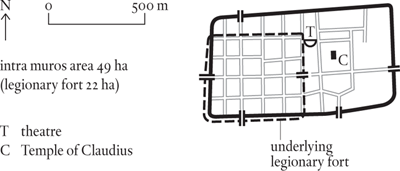
Essex, England
Classical Camulodunum; initial capital of the province of Britain
Colchester was the site of one of the first oppida of Celtic Britain, a proto-town with a small year-round population, but earthworks extensive enough to accommodate the entire tribal levy in times of emergency. Initially it served the local tribe, the Trinovantes, but in 10 BC the Trinovantes succumbed to their more powerful neighbours the Catuvellauni, and Camulodunum, to give the oppidum its Celtic name, became the seat of the Catuvellaunian king Cunobelinus (Shakespeare’s Cymbeline). As such, it was the first objective of the Roman army in the invasion of Britain, for the Catuvellauni were sworn enemies of ROME, and determined to maintain both their own freedom and their grip on the other tribes in the south-east of England.

The initial phase of the invasion under the emperor Claudius was a resounding success, Camulodunum falling on schedule in the summer of AD 43. Three of the four legions taking part in the campaign then redeployed to the unconquered parts of the country, leaving the Twentieth Legion in garrison at Camulodunum. The legion immediately set about building itself a fortress of standard size (twenty-two hectares) and shape.
In AD 49 or 50, the Twentieth Legion left the area and the fortress was made the nucleus of a Roman colony, initially for discharged veterans of the invasion force. It also became – we think – the seat of the new province’s government. The urban area was more than doubled, to forty-nine hectares, and work was begun on a temple to Claudius, the emperor who had given the go-ahead for the invasion and had appeared in southern Britain in time to enter Camulodunum in triumph, on the back of an elephant. But a mere ten years after the Twentieth Legion had left, both temple and town were burned to the ground, when the Iceni of Norfolk rose in revolt under their queen, Boudicca. The revolt was crushed that same year and Colchester was able to start rebuilding almost immediately, but in the interim its capital status had gone for good. LONDON had proved to be a much more convenient base for the province’s government, and Colchester, while keeping its rank as a Roman colony, became a backwater, a modest county town with no known history. It is also without significant visible remains of the Roman period, although some of the vaulted underpinnings of the Temple of Claudius survive beneath the town’s Norman castle.